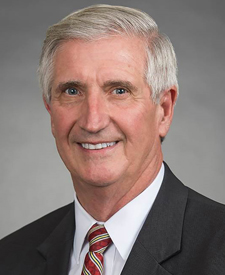
Acting dean of the Bush School, Andrew H. Card, spoke to students on Monday, October 3, about his leadership experiences in three White House administrations. Part of the School’s Conversations in Leadership series, the presentation was facilitated by the Bush School Student Government Association’s Speaker and Leadership Development program.
Dean Card began the hour-long lunch session by describing how students can discover if they and the people around them are leaders. He acknowledged that the only true way to find out is to test one’s own capacity. He then outlined the qualities he believes are common to emerging leaders, including optimism, courage, a love of being loved, and the willingness to embrace power.
In elaborating on each of these qualities, the dean gave students pragmatic advice about how to be effective leaders, noting that leaders must be optimistic, or willing to seek solutions and believe that they are part of the solution to problems. In addition, Card said that leaders must understand the duality inherent in leadership roles: there will be times when leaders are adored and times when they are intensely disliked. He clarified this duality by citing the American political system, which encourages candidates to run on platforms inspiring love and devotion among constituents and then exposes elected leaders to periods of intense loneliness when constituents do not approve of their activities.
Dean Card also suggested that leaders must have the tools necessary to be a good leader; for him, this means embracing power, an action that followers tend not to appreciate. Effective leaders, however, realize that they can either receive or take power; and how a leader uses power determines why constituents follow him or her. The use of power involves managing expectations, he added, and a leader’s knowledge of how to manage expectations defines the tone and manner of leadership.
This often entails using power in one of three ways: through love, fear, or respect. Ideally, Card said, leaders will seek respect because they recognize that they will not be loved all the time. If they strive to maintain their followers’ admiration, they will ultimately lose their respect. He emphasized that leading through respect motivates people, and encourages them to do what they often do not want to do. Leaders must realize, however, that commanding fear is necessary to sustain leadership during times when constituents do not agree with the leader.
The students not only got practical leadership advice from Dean Card, but also enjoyed hearing real life examples of how these qualities and suggestions work as he related his personal experiences with three presidents of the United States. He cited President George W. Bush’s controversial policy shift following 9/11, establishing countries as either “with us” or “against us” in the war on terrorism, as a prime example of the three ways in which leaders lead. This statement caused countries to choose their allies based on fear, love, or respect.
After his presentation, the dean took questions from students, with topics ranging from inquiry about his toughest leadership position and how to embrace leadership as an entry-level job candidate to establishing credibility as a leader.
Second-year MPSA student Michael Ghutzman said: “At the Bush School, students are constantly given opportunities to interact with and listen to notable speakers from various fields. Dean Card gave an outstanding talk on the topic of leadership. Where else would a student have the opportunity to learn leadership skills from the second longest serving chief of staff in US history?”
